South Austin Ecovillage Prepares for a Radically Different Future
By Cat DeLaura
Reporting Texas
On a cold night in November, Troy Baker demonstrates to seven people gathered around a rickety kitchen table how to form seed bombs out of wildflower seeds, compost and clay. Later the bombs will be hurled out of car windows into barren front yards. “Guerilla gardening,” Baker calls it.
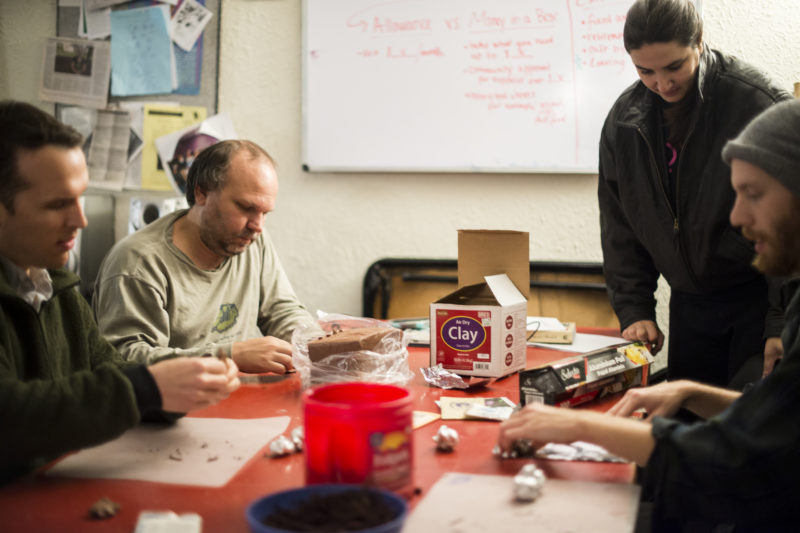
Residents of Roots Ecovillage in Austin, Texas, demonstrate how to make seed bombs on Nov. 14. The group also hosts native plant info sessions and gardening workshops to educate the community about sustainability. Mary Schmidt/Reporting Texas
Most of the attendees live in the house. It’s an unassuming home on a quiet residential street in South Austin. The only thing that sets it apart from others in the neighborhood is a hand-painted sign declaring in colorful letters, “Radical Organization for Organic Teaching and Sustainability.”
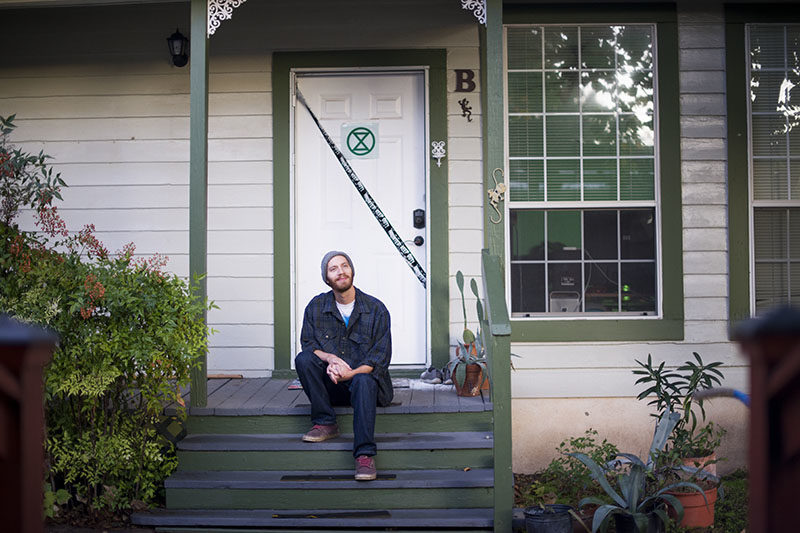
Troy Baker sits on the steps of his home, Roots Ecovillage in Austin, Texas. “We’re a part of nature; we don’t have dominion over it,” Baker said. “This is our way of giving back to the whole universe.”
Roots members consider the enterprise an ecovillage — an intentional community of people that strive to live in an ecologically sustainable way. Responding to increasingly dire warnings about climate change and social isolation, the members of Roots see themselves as the leaders of a new way of life for the post-capitalist future they say is inevitable.
Devotion to a cause is typical of intentional communities popping up around the country, said Sky Blue, director of the Foundation for Intentional Communities, a grassroots organization focused on supporting and promoting intentional communities. Blue defines them as “cooperative, place-based groups of people, who are living together, sharing resources with some kind of shared purpose and some kind of governance, management, decision making structure.”
In Blue’s experience, intentional communities often form as a reaction to problems their members see in the world. Instead of seeing the communities as a way to escape, Blue said, “it’s much more useful to see them as laboratories, as training grounds, as microcosms of larger society where we can examine what’s going on in the world.”
Interest in intentional communities is “substantially on the rise,” Blue said, basing the assessment on increasing web traffic, social media mentions and news coverage. “Now, whether or not that’s translating into more intentional communities existing is much harder to say.”
Roots’ longevity — it started in 2012 — sets it apart. In a 2016 update to the Foundation for Intentional Communities’ directory, which documents both forming and formed communities, roughly half of the over 2,000 listings had to be removed due to inactivity or closure.
Nearly 25 people have lived at Roots during its existence, but currently there are only seven. They have an application and interview process to vet candidates, and they try to maintain a wait list of people who would be a good fit. Besides rent, utilities and a voluntary $85 a month to pay for the shared meals on weekdays, there is no fee to join.
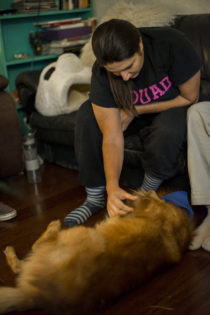
Monica Bahtia, who has lived at Roots since 2018, pets one of the dogs living in the house. Mary Schmidt/Reporting Texas
For Roots member Monica Bahtia, 23, “The goal is to be as ecologically sustainable as we can be and to teach other people how they can also live in ecologically sustainable ways.”
Bahtia joined Roots in 2018 when she moved to Austin to get a doctoral degree in sociology from the University of Texas at Austin. Roots’ sustainability focus and goals are nonnegotiable for Bahtia. “We know we’re facing catastrophic climate change, so we literally have to do those things. Someone has to start figuring out a way to live that way that’s doable and realistic for the society we live in.”
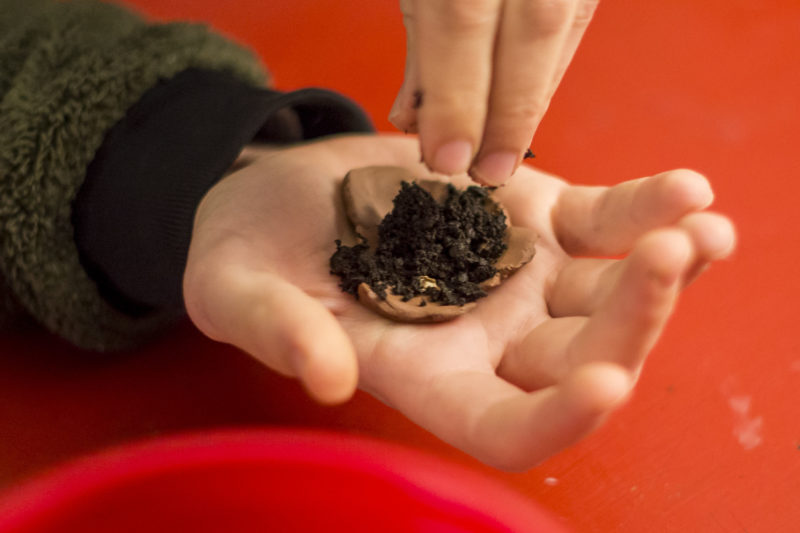
Ecovillage residents place mulch and mixed flower seeds on top of clay to create a seed bomb. Once the seed bomb is completed, it can be tossed onto barren land in hopes it will sprout. Mary Schmidt/Reporting Texas
The group has lofty goals — a permaculture garden that can feed the community and their own renewable energy source disconnected from the power grid, among others. Meanwhile they are taking small practical steps: setting up rainwater collection, growing what food they can on their property, reducing energy use, dumpster diving for food, especially outside bakeries, which often just toss their baked goods at the end of each day, and doing more things together.
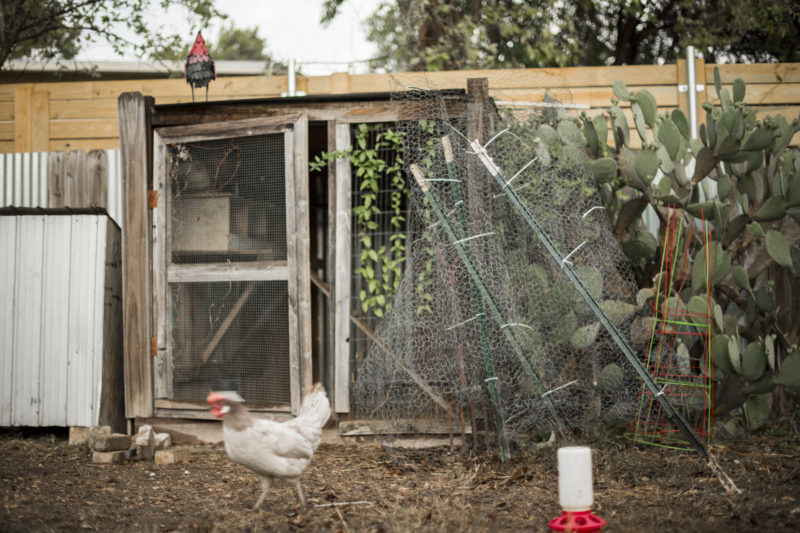
A chicken strolls around the yard it shares with seven residents, three dogs and three cats. One tenant joked that no more animals are allowed. Mary Schmidt/Reporting Texas
“Even beyond the specific sustainability projects we do, just the fact that we’re living together is something that in order to fight climate change people have to start doing,” Bahtia said. “They have to stop having this really individualistic mindset and start doing things together as a community.”
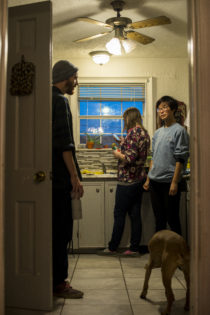
Ecovillage members cook dinner together every night, accommodating food allergies or dietary choices. The communal living arrangement helps stop individualistic mindsets by requiring them to share meals, residents said. Mary Schmidt/Reporting Texas
For Baker, 25, an undergraduate student at UT studying sociology, “a lot of it is trying to live a preindustrial life as much as possible.” To reduce energy waste, he uses only candlelight in his bedroom after dark. Baker joined the community in September 2018 and previously lived in the 21st Street student co-op. From a young age, he knew he wanted to live his life differently.
“I didn’t believe in personal property. I don’t believe that humans could own land,” Baker said. “We’re a part of nature. We’re not above it or have dominion over it. To me it’s important to be able to share things, to give to people but not just to other people but to all of nature.”
Blue said intentional communities face two big challenges: money and interpersonal conflict.
Roots’ members believe they have navigated those issues with consensus-based governance. Members meet every Monday, and anyone can propose agenda items. There is no formal voting, but anyone can block any proposition. If something is blocked, members collaborate to find a compromise that works for everyone. Nothing is approved without everyone’s consent, and members say the process works well.
“It’s actually really smooth,” Baker said. “It’s just a way to make sure everyone is on the same page and everyone has a voice in every decision that’s made.”
In 2018, Roots survived an unplanned move. After six years in their original home at Manchaca and Ben White, their landlord asked them to move out. A concerned neighbor had noticed various code violations on the property.
“Moving was definitely a blessing in disguise,” Baker said. After a six-month interim, the group found its current house.
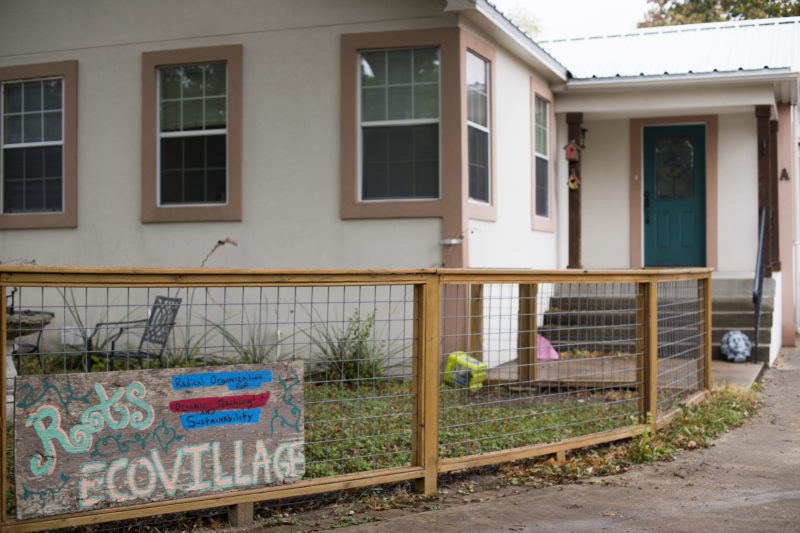
The entrance of Roots Ecovillage welcomes visitors to its newest location. Roots was founded by 10 activists from the Occupy movement in 2011 and takes a strong political and social stance for equality and sustainability. Mary Schmidt/Reporting Texas

A resident walks toward the seed bomb workshop that is open to the public. Finding affordable land in Austin is difficult, so members have discussed the possibility of leaving the city. Mary Schmidt/Reporting Texas
Their long-term goal is to buy property and create a fully sustainable off-grid community. Ideally, they will grow to about 30 people. The group is optimistic it can own land within five years, but finding affordable options around Austin has been difficult.
“We’ve also talked about the possibility of not even staying in the Austin area,” Bahtia said, “Because it’s not necessarily the best climate for the kind of stuff we want to do.”
Most members see Roots as a long-term commitment, not a cheap place to live until they figure something else out. This is their home.
“I would love to raise my kids in this community,” Bahtia said. “I’m really committed to being here for the long term, and I think most people who are here feel the same way.”